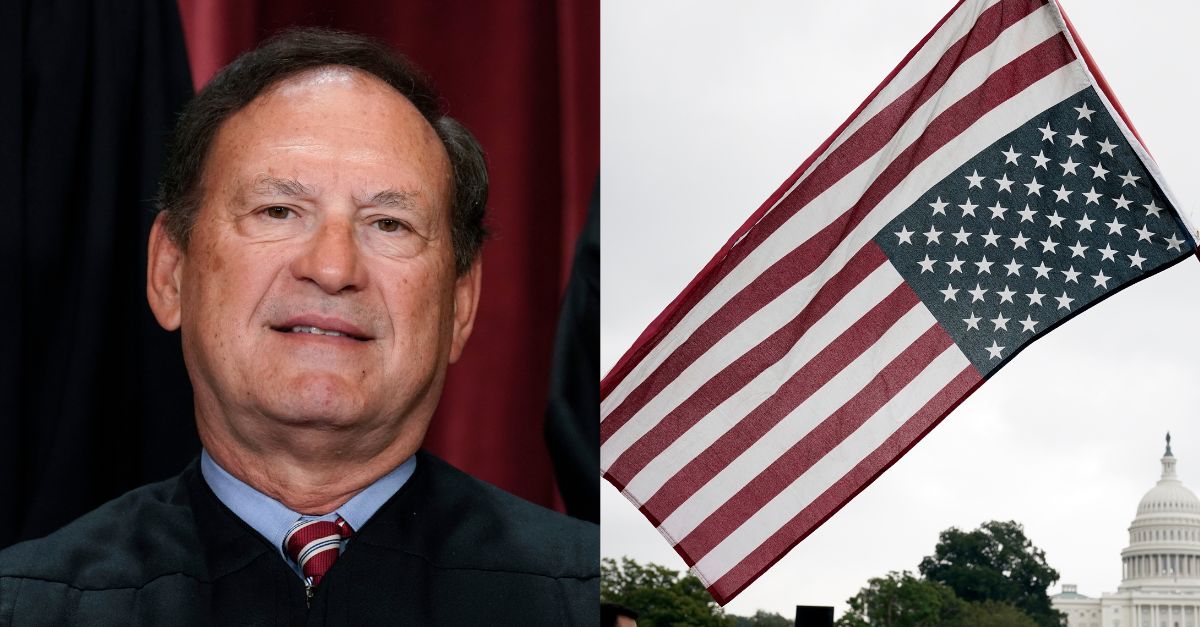
On the left side, we see Associate Justice Samuel Alito standing with other Supreme Court members for a new group photo at the Supreme Court building in Washington on October 7, 2022. On the right side, a protestor is shown waving an upside-down American flag at a rally in Washington on Saturday, September 18, 2021.
A federal district judge violated judicial ethics rules by publishing an essay saying that it was “dumb” for U.S. Supreme Court Justice Samuel Alito to fly a “stop the steal” flag in front of his house after the Jan. 6 insurrection.
The New York Times reported last May that it obtained photos of an upside-down flag displayed at the Alito home in Alexandria, Virginia, on Jan. 17, 2021, days after the insurrection at the U.S. Capitol. The display was widely seen as signaling agreement with unsupported claims of fraud in the 2020 presidential election and ignited widespread criticism of the Alitos for what was viewed as their public statement during a time of political tension as well as a time when a case about Donald Trump’s immunity was before the Supreme Court.
The Supreme Court ultimately held in July that Trump could not be prosecuted for actions that were within his powers as president, and the case was dropped after Trump won the Nov. 5 presidential election.
Alito provided a statement to the Times in which he said, “I had no involvement whatsoever in the flying of the flag,” but offered, “It was briefly placed by Mrs. Alito in response to a neighbor’s use of objectionable and personally insulting language on yard signs.”
One of the many individuals within the legal community who commented on the incident was Senior U.S. District Judge Michael Ponsor, a Bill Clinton appointee to the District of Massachusetts. Ponsor penned a May 24, 2024, essay in the Times entitled, “A Federal Judge Wonders: How Could Alito Have Been So Foolish?”
In the piece, Ponsor sharply criticized Alito for his flag-related choices, both in Virginia and in New Jersey:
To me, the flag issue is much simpler. The fact is that, regardless of its legality, displaying the flag in that way, at that time, shouldn’t have happened. To put it bluntly, any judge with reasonable ethical instincts would have realized immediately that flying the flag then and in that way was improper. And dumb.
The same goes for the flying of an “Appeal to Heaven” flag at Justice Alito’s vacation house along the New Jersey shore. Like the upside-down flag, this flag is viewed by a great many people as a banner of allegiance on partisan issues that are or could be before the court.
The Article III Project, a conservative advocacy group run by Trump ally Mike Davis, volleyed with a judicial misconduct complaint against Ponsor for writing the essay. The case was then transferred to the Virginia-based 4th Circuit Judicial Council, where Chief U.S. Circuit Judge Albert Diaz, a Barack Obama appointee, presided over the matter.
Diaz brought the case to a conclusion with an order made public Tuesday. In it, Diaz said Ponsor violated judicial ethics rules regarding commenting on pending cases due to the essay’s “political implications and undertones.”
The order included a Nov. 20 letter sent by Ponsor to Diaz, which offered an “unreserved apology” and said that Ponsor now realizes that the essay could have been interpreted as a call for Alito to recuse himself in some cases.
“The fact that I did not have any particular case in mind when I drafted the piece does not reduce the gravity of my lapse,” Ponsor said. He also promised to seek advice from a judicial panel before engaging in any future public nonjudicial writing.
Diaz’s order said that Ponsor’s letter constituted “voluntary corrective action sufficient to allow for the conclusion of the complaint.”
You can read the full order and letter here.












